北师大版高中英语模块6 Unit 18 Beauty used to do和would;限定词的用法
文档属性
| 名称 | 北师大版高中英语模块6 Unit 18 Beauty used to do和would;限定词的用法 |
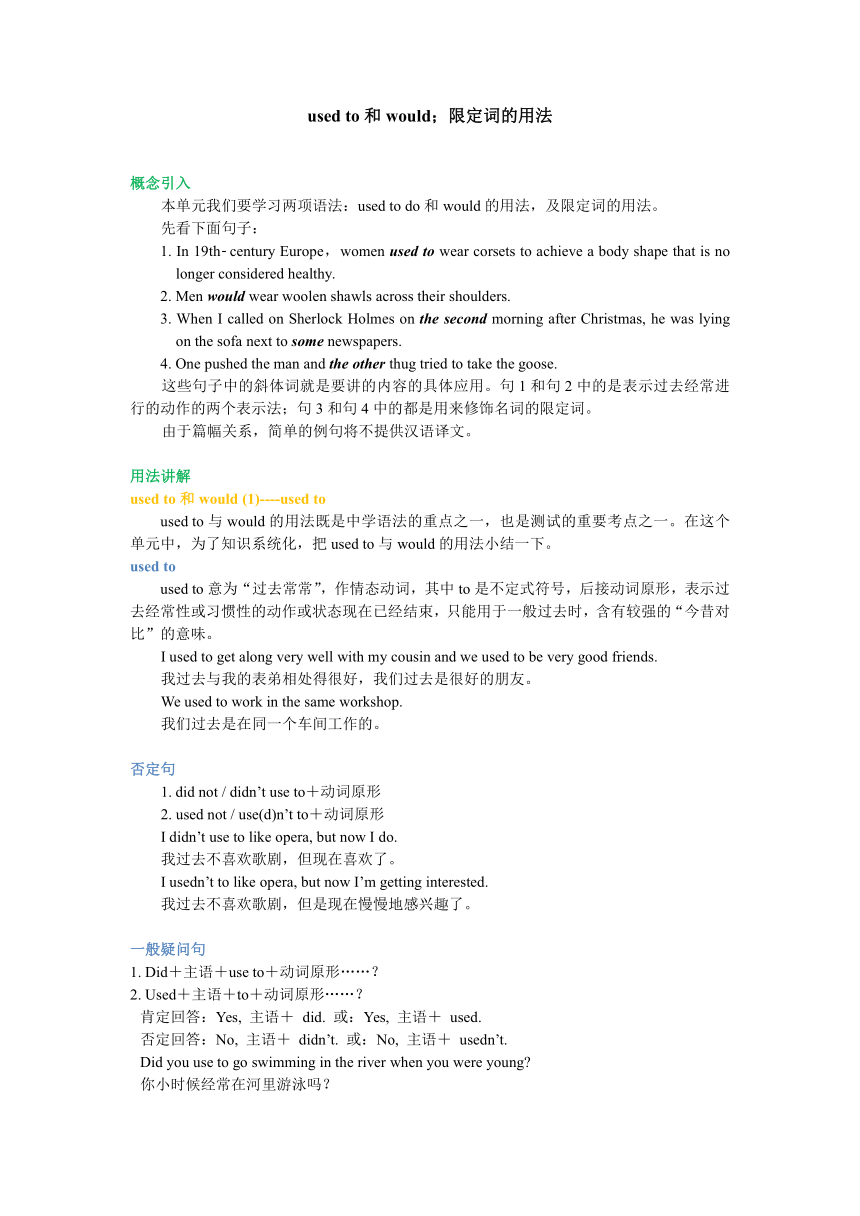
|
|
| 格式 | zip | ||
| 文件大小 | 38.6KB | ||
| 资源类型 | 教案 | ||
| 版本资源 | 北师大版 | ||
| 科目 | 英语 | ||
| 更新时间 | 2019-11-14 21:54:44 | ||
图片预览

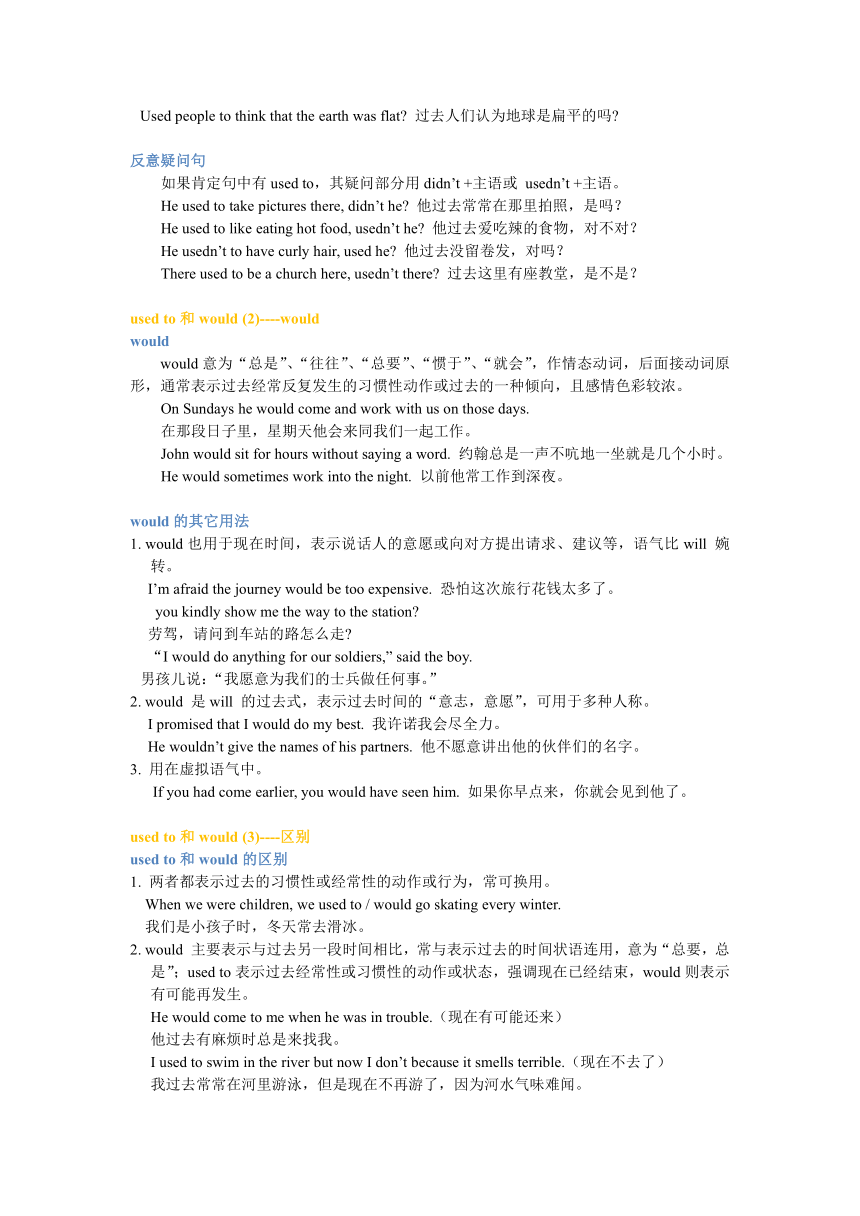
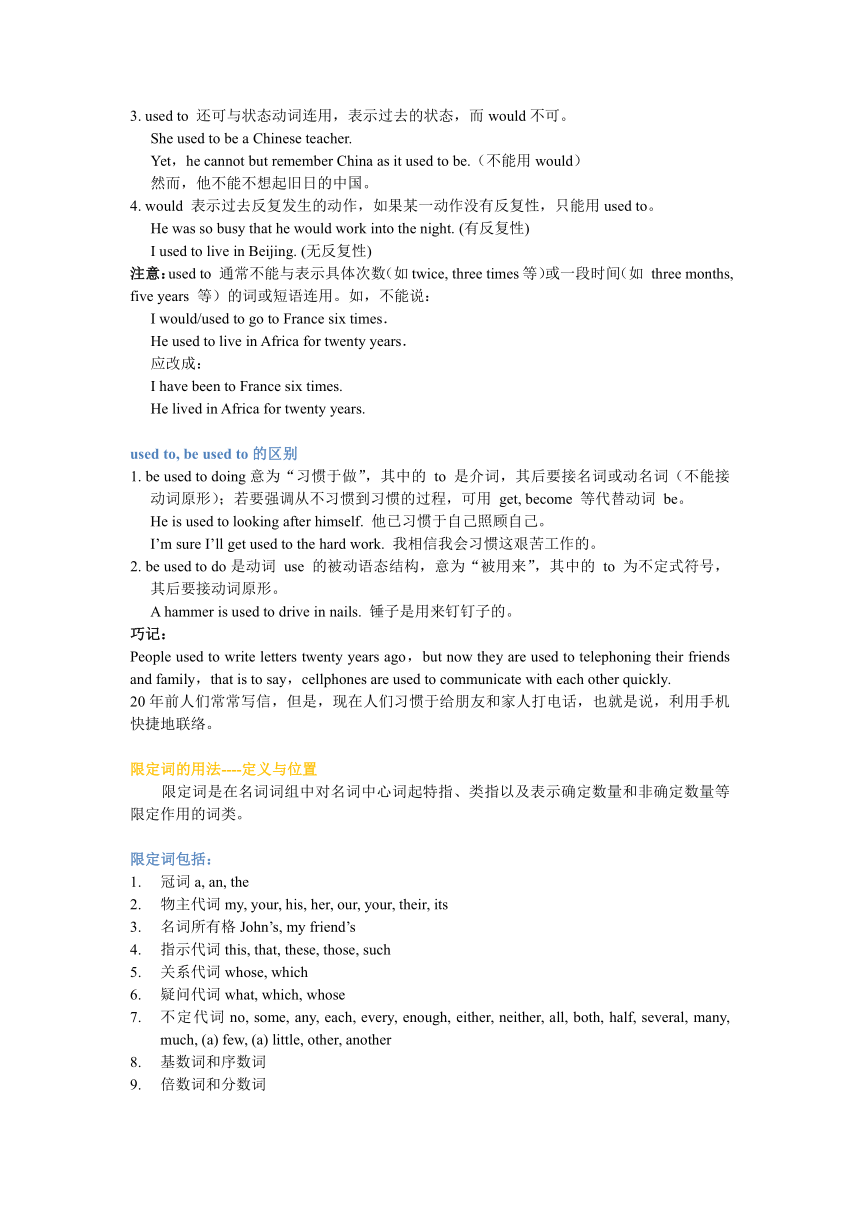
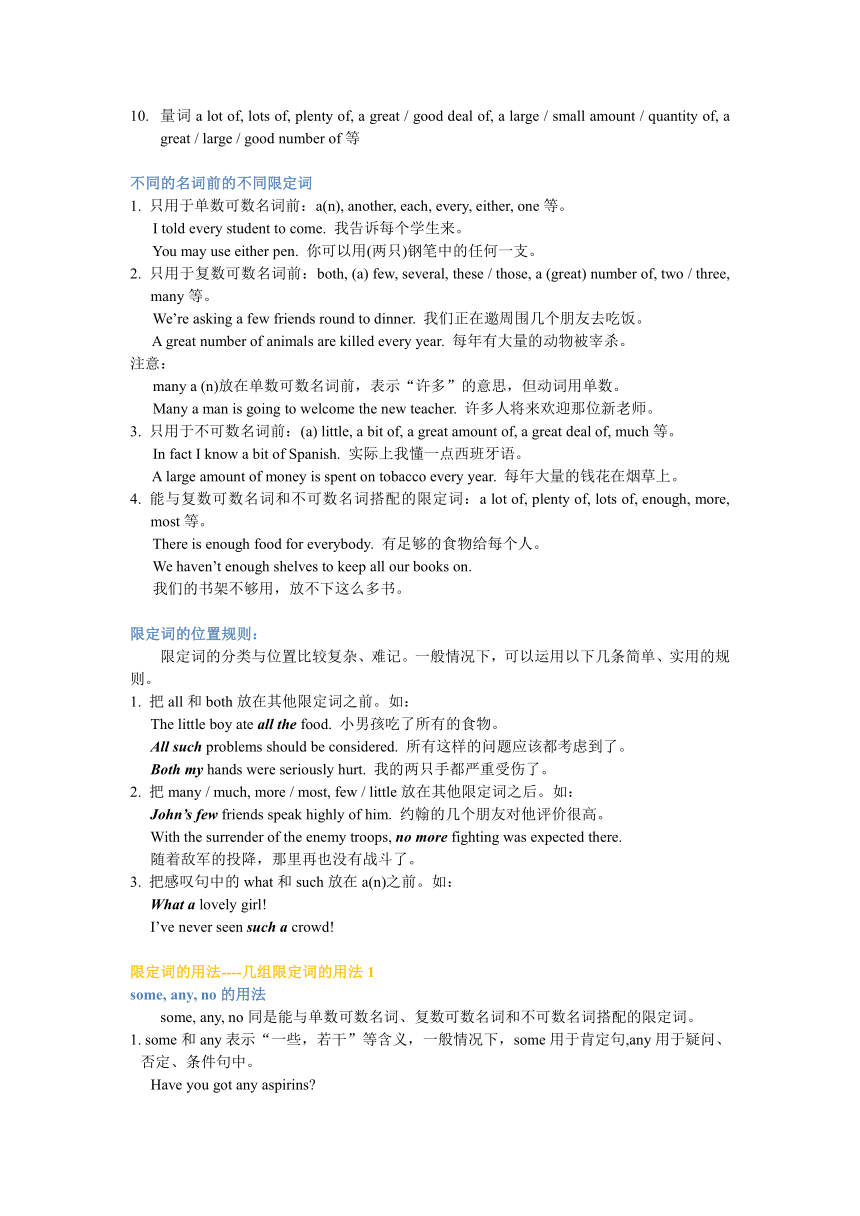
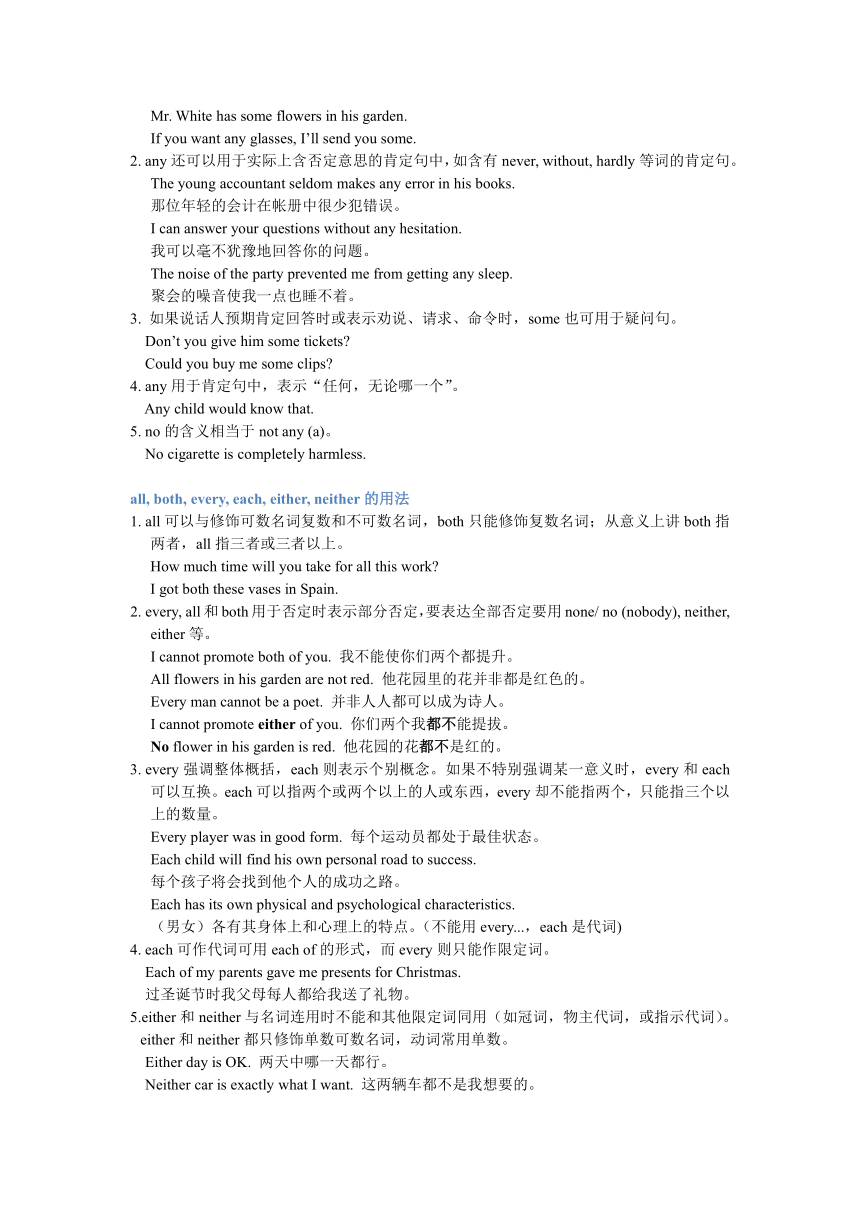
文档简介
used to和would;限定词的用法
概念引入
本单元我们要学习两项语法:used to do和would的用法,及限定词的用法。
先看下面句子:
1. In 19th-century Europe,women used to wear corsets to achieve a body shape that is no longer considered healthy.
2. Men would wear woolen shawls across their shoulders.
3. When I called on Sherlock Holmes on the second morning after Christmas, he was lying on the sofa next to some newspapers.
4. One pushed the man and the other thug tried to take the goose.
这些句子中的斜体词就是要讲的内容的具体应用。句1和句2中的是表示过去经常进行的动作的两个表示法;句3和句4中的都是用来修饰名词的限定词。
由于篇幅关系,简单的例句将不提供汉语译文。
用法讲解
used to和would (1)----used to
used to与would的用法既是中学语法的重点之一,也是测试的重要考点之一。在这个单元中,为了知识系统化,把used to与would的用法小结一下。
used to
used to意为“过去常常”,作情态动词,其中to是不定式符号,后接动词原形,表示过去经常性或习惯性的动作或状态现在已经结束,只能用于一般过去时,含有较强的“今昔对比”的意味。
I used to get along very well with my cousin and we used to be very good friends.
我过去与我的表弟相处得很好,我们过去是很好的朋友。
We used to work in the same workshop.
我们过去是在同一个车间工作的。
否定句
1. did not / didn’t use to+动词原形
2. used not / use(d)n’t to+动词原形
I didn’t use to like opera, but now I do.
我过去不喜欢歌剧,但现在喜欢了。
I usedn’t to like opera, but now I’m getting interested.
我过去不喜欢歌剧,但是现在慢慢地感兴趣了。
一般疑问句
1. Did+主语+use to+动词原形……?
2. Used+主语+to+动词原形……?
肯定回答:Yes, 主语+ did. 或:Yes, 主语+ used.
否定回答:No, 主语+ didn’t. 或:No, 主语+ usedn’t.
Did you use to go swimming in the river when you were young?
你小时候经常在河里游泳吗?
Used people to think that the earth was flat? 过去人们认为地球是扁平的吗?
反意疑问句
如果肯定句中有used to,其疑问部分用didn’t +主语或 usedn’t +主语。
He used to take pictures there, didn’t he? 他过去常常在那里拍照,是吗?
He used to like eating hot food, usedn’t he? 他过去爱吃辣的食物,对不对?
He usedn’t to have curly hair, used he? 他过去没留卷发,对吗?
There used to be a church here, usedn’t there? 过去这里有座教堂,是不是?
used to和would (2)----would
would
would意为“总是”、“往往”、“总要”、“惯于”、“就会”,作情态动词,后面接动词原形,通常表示过去经常反复发生的习惯性动作或过去的一种倾向,且感彩较浓。
On Sundays he would come and work with us on those days.
在那段日子里,星期天他会来同我们一起工作。
John would sit for hours without saying a word. 约翰总是一声不吭地一坐就是几个小时。
He would sometimes work into the night. 以前他常工作到深夜。
would的其它用法
1. would也用于现在时间,表示说话人的意愿或向对方提出请求、建议等,语气比will 婉转。
I’m afraid the journey would be too expensive. 恐怕这次旅行花钱太多了。
you kindly show me the way to the station?
劳驾,请问到车站的路怎么走?
“I would do anything for our soldiers,” said the boy.
男孩儿说:“我愿意为我们的士兵做任何事。”
2. would 是will 的过去式,表示过去时间的“意志,意愿”,可用于多种人称。
I promised that I would do my best. 我许诺我会尽全力。
He wouldn’t give the names of his partners. 他不愿意讲出他的伙伴们的名字。
3. 用在虚拟语气中。
If you had come earlier, you would have seen him. 如果你早点来,你就会见到他了。
used to和would (3)----区别
used to和would的区别
1. 两者都表示过去的习惯性或经常性的动作或行为,常可换用。
When we were children, we used to / would go skating every winter.
我们是小孩子时,冬天常去滑冰。
2. would 主要表示与过去另一段时间相比,常与表示过去的时间状语连用,意为“总要,总是”;used to表示过去经常性或习惯性的动作或状态,强调现在已经结束,would则表示有可能再发生。
He would come to me when he was in trouble.(现在有可能还来)
他过去有麻烦时总是来找我。
I used to swim in the river but now I don’t because it smells terrible.(现在不去了)
我过去常常在河里游泳,但是现在不再游了,因为河水气味难闻。
3. used to 还可与状态动词连用,表示过去的状态,而would不可。
She used to be a Chinese teacher.
Yet,he cannot but remember China as it used to be.(不能用would)
然而,他不能不想起旧日的中国。
4. would 表示过去反复发生的动作,如果某一动作没有反复性,只能用used to。
He was so busy that he would work into the night. (有反复性)
I used to live in Beijing. (无反复性)
注意:used to 通常不能与表示具体次数(如twice, three times等)或一段时间(如 three months, five years 等)的词或短语连用。如,不能说:
I would/used to go to France six times.
He used to live in Africa for twenty years.
应改成:
I have been to France six times.
He lived in Africa for twenty years.
used to, be used to的区别
1. be used to doing意为“习惯于做”,其中的 to 是介词,其后要接名词或动名词(不能接动词原形);若要强调从不习惯到习惯的过程,可用 get, become 等代替动词 be。
He is used to looking after himself. 他已习惯于自己照顾自己。
I’m sure I’ll get used to the hard work. 我相信我会习惯这艰苦工作的。
2. be used to do是动词 use 的被动语态结构,意为“被用来”,其中的 to 为不定式符号,其后要接动词原形。
A hammer is used to drive in nails. 锤子是用来钉钉子的。
巧记:
People used to write letters twenty years ago,but now they are used to telephoning their friends and family,that is to say,cellphones are used to communicate with each other quickly.
20年前人们常常写信,但是,现在人们习惯于给朋友和家人打电话,也就是说,利用手机快捷地联络。
限定词的用法----定义与位置
限定词是在名词词组中对名词中心词起特指、类指以及表示确定数量和非确定数量等限定作用的词类。
限定词包括:
冠词a, an, the
物主代词my, your, his, her, our, your, their, its
名词所有格John’s, my friend’s
指示代词this, that, these, those, such
关系代词whose, which
疑问代词what, which, whose
不定代词no, some, any, each, every, enough, either, neither, all, both, half, several, many, much, (a) few, (a) little, other, another
基数词和序数词
倍数词和分数词
量词a lot of, lots of, plenty of, a great / good deal of, a large / small amount / quantity of, a great / large / good number of等
不同的名词前的不同限定词
1. 只用于单数可数名词前:a(n), another, each, every, either, one等。
I told every student to come. 我告诉每个学生来。
You may use either pen. 你可以用(两只)钢笔中的任何一支。
2. 只用于复数可数名词前:both, (a) few, several, these / those, a (great) number of, two / three, many等。
We’re asking a few friends round to dinner. 我们正在邀周围几个朋友去吃饭。
A great number of animals are killed every year. 每年有大量的动物被宰杀。
注意:
many a (n)放在单数可数名词前,表示“许多”的意思,但动词用单数。
Many a man is going to welcome the new teacher. 许多人将来欢迎那位新老师。
3. 只用于不可数名词前:(a) little, a bit of, a great amount of, a great deal of, much等。
In fact I know a bit of Spanish. 实际上我懂一点西班牙语。
A large amount of money is spent on tobacco every year. 每年大量的钱花在烟草上。
4. 能与复数可数名词和不可数名词搭配的限定词:a lot of, plenty of, lots of, enough, more, most等。
There is enough food for everybody. 有足够的食物给每个人。
We haven’t enough shelves to keep all our books on.
我们的书架不够用,放不下这么多书。
限定词的位置规则:
限定词的分类与位置比较复杂、难记。一般情况下,可以运用以下几条简单、实用的规则。
1. 把all和both放在其他限定词之前。如:
The little boy ate all the food. 小男孩吃了所有的食物。
All such problems should be considered. 所有这样的问题应该都考虑到了。
Both my hands were seriously hurt. 我的两只手都严重受伤了。
2. 把many / much, more / most, few / little放在其他限定词之后。如:
John’s few friends speak highly of him. 约翰的几个朋友对他评价很高。
With the surrender of the enemy troops, no more fighting was expected there.
随着敌军的投降,那里再也没有战斗了。
3. 把感叹句中的what和such放在a(n)之前。如:
What a lovely girl!
I’ve never seen such a crowd!
限定词的用法----几组限定词的用法1
some, any, no的用法
some, any, no同是能与单数可数名词、复数可数名词和不可数名词搭配的限定词。
1. some和any表示“一些,若干”等含义,一般情况下,some用于肯定句,any用于疑问、否定、条件句中。
Have you got any aspirins?
Mr. White has some flowers in his garden.
If you want any glasses, I’ll send you some.
2. any还可以用于实际上含否定意思的肯定句中,如含有never, without, hardly等词的肯定句。
The young accountant seldom makes any error in his books.
那位年轻的会计在帐册中很少犯错误。
I can answer your questions without any hesitation.
我可以毫不犹豫地回答你的问题。
The noise of the party prevented me from getting any sleep.
聚会的噪音使我一点也睡不着。
3. 如果说话人预期肯定回答时或表示劝说、请求、命令时,some也可用于疑问句。
Don’t you give him some tickets?
Could you buy me some clips?
4. any用于肯定句中,表示“任何,无论哪一个”。
Any child would know that.
5. no的含义相当于not any (a)。
No cigarette is completely harmless.
all, both, every, each, either, neither的用法
1. all可以与修饰可数名词复数和不可数名词,both只能修饰复数名词;从意义上讲both指两者,all指三者或三者以上。
How much time will you take for all this work?
I got both these vases in Spain.
2. every, all和both用于否定时表示部分否定,要表达全部否定要用none/ no (nobody), neither, either等。
I cannot promote both of you. 我不能使你们两个都提升。
All flowers in his garden are not red. 他花园里的花并非都是红色的。
Every man cannot be a poet. 并非人人都可以成为诗人。
I cannot promote either of you. 你们两个我都不能提拔。
No flower in his garden is red. 他花园的花都不是红的。
3. every强调整体概括,each则表示个别概念。如果不特别强调某一意义时,every和each可以互换。each可以指两个或两个以上的人或东西,every却不能指两个,只能指三个以上的数量。
Every player was in good form. 每个运动员都处于最佳状态。
Each child will find his own personal road to success.
每个孩子将会找到他个人的成功之路。
Each has its own physical and psychological characteristics.
(男女)各有其身体上和心理上的特点。(不能用every...,each是代词)
4. each可作代词可用each of的形式,而every则只能作限定词。
Each of my parents gave me presents for Christmas.
过圣诞节时我父母每人都给我送了礼物。
5.either和neither与名词连用时不能和其他限定词同用(如冠词,物主代词,或指示代词)。either和neither都只修饰单数可数名词,动词常用单数。
Either day is OK. 两天中哪一天都行。
Neither car is exactly what I want. 这两辆车都不是我想要的。
There were trees and flowers on either side of the street. 街两旁都有树和花。
6. either也可指“两个都”,与both的意义相近,但both后接复数名词,either则只接单数名词,而且both还可与其他限定词搭配,either, neither与其他限定词连用时,则使用either of, neither of结构。
Both (of) my children have been to America.
Neither of his cats has been fed. 他的两只猫都还没喂。
限定词的用法----几组限定词的用法2
few,a few,little,a little
1. few,a few修饰可数名词,little,a little修饰不可数名词。
2. a few,a little含肯定意味,few,little含否定意味。这里所谓的“肯定意味”和“否定意味”应该这样来理解:同样是半杯水,口渴者会认为:There is little water in the glass. 而不口渴的人则会认为:There is a little water in the glass.
3. 当few被last,past,next,very等词所修饰时,few前加冠词。
In the last few minutes, he checked up his paper again. 最后几分钟里,他又检查他的试卷。
so little还是such little
little表示数量方面的“少”,则用so little;表示形状体积的“小”,则用such little。
It’s no wonder that such little animals eat so little food. 难怪这些小动物吃那么少的食物。
another
1. another可视为由“an+other”构成,接单数可数名词时,表示“另一个”。
Let me have another cup of tea. 给我再来一杯茶。
If I were you, I should get another lawyer. 如果我是你,我就请别的律师。
2. another后接few 或数词修饰,或不可数名词之前有 piece of 之类的单位词时等,表示“另外的”。如:
I could go on for another two hours. 我再讲两个小时都讲不完。
I need another few days before l can make up my mind. 我还需几天才能决定。
冠词的用法:特指与泛指
1. 特指往往表示特定的或已知的人或事物,多用定冠词the;
2. 泛指则表示某一人或事物,即不确定的人或事物,多用不定冠词。
巧记冠词“顺口溜”:
1. 定冠词the的用法
特指双熟悉,上文已提及;(特指;谈话双方都熟悉的人或事物;上文提到的人或事物)
世上独无二,序数最高级;(世界上独一无二的事物前;序数词、形容词的最高级前)
某些专有名,习语及乐器。(某些专有名词前;习惯短语中和西洋乐器名词前)
2. 不定冠词a/an的用法
泛指单数和首提,某个每个又一个;(单数可数名词泛指或首次提到时;某/每/又一个)
物质名词具体化,相同还是抽象词;(具体化的物质名词和抽象名词前)
三餐四季有修饰,感叹句中有名单。(有修饰词的三餐和四季前;感叹句中有单数名词)
He went to the station in a black car. 他坐着一辆黑色的轿车去了车站。
This is the third time I’ve been here. I want to be here a fourth time.
这是第三次我来这里,我想再来一次。
He is not a success as a leader, but he has gained much experience in teaching.
作为领导人,他不是个成功者,但是在教学方面也获得了许多经验。
巩固练习
Ⅰ. 翻译句子
1. 刚才一位警察抓住个小偷。
__________________________________________________________
2. 你想再来一杯茶吗?
__________________________________________________________
3. 他的工作是修理自行车,那时他每天常常工作十四个小时。
__________________________________________________________
4. 错过这次机会是件很遗憾的事。?
__________________________________________________________
5. 她过去常常玩电脑游戏吗?
__________________________________________________________
6. 我过去常常起床很早并且在早餐前散步一小时。
__________________________________________________________
7. 我们商店还需要三个店员(assistant)。
__________________________________________________________
8. 他们中没几个到场。
__________________________________________________________
9. 恪守我们的诺言是多么的重要啊!
__________________________________________________________
10. 过去常超重的汤姆现在已经习惯了健康的饮食。
__________________________________________________________
Ⅱ. 单项选择
—I weigh less than I ________.
—Congratulations!
A.got used to B.used to be C.used to D.was used to
2. I ate ________sandwich while I was waiting for ________ 20:08 train.
A.the;a B.the;the C.a;the D.a;a
3. —It’s said John will be in a job paying over $ 60,000 ________ year.
—Right,he will also get paid by ________ week.
A.the;the B.a;the C.the;a D.a;a
4. There ________a lot of local mines in the south,but many of them have been closed or are to be closed.
A.use to B.used to be C.used to have D.would
5. In many places in China,________bicycle is still ________popular means of transportation.
A.a;the B./;a C.the;a D.the;the
6. There used to be a temple here,_______?
A.used it B.usedn’t it C.usedn’t there D.don’t there
7. He doesn’t have ________furniture in his room—just an old desk.
A.any B.many C.some D.much
8. He ________in the mountain village for 20 years.
A.would live B.used to live C.had lived D.lived
9. There ______be a bookshelf in this room, but there isn’t now.
A.could B.used to C.would D.might
10.He ________bring me some books to read every time he came back from abroad.
A.used to B.would C.should D.can
11. —Your daughter is really outgoing.
—She ________ be very shy. Whenever a stranger came to our house,she ________ hide in a closet.
A.ought to;must B.can;might C.used to;would D.should;might
12. The _______ shoes were covered with mud, so I asked them to take them off before they got into _______ car.
A.girl’s;Tom’s B.girls’;Toms’ C.girls’;Tom’s D.girl’s;Toms’
13. I’ll spend half of my holiday practising English and ________ half learning drawing.
A.another B.the other C.other’s D.other
14. Dr. Peter Spence,________headmaster of the school,told us, “________fifth of pupils here go on to study at Oxford and Cambridge.”
A.不填;A B.不填;The C.the;The D.a;A
15. ______recent report stated that the number of Spanish speakers in the U.S. would be higher than the number of English speaker by_____ year 2090.
A. A, the B. A, / C. The, / D. The, a
16. If you go by ______train, you can have quite a comfortable journey, but make sure you get _____fast one.
A. /, / B. /, a C. the, a D. /, /
17. It is often said that ____teachers have _______very easy life, but it isn’t always true.
A /,/ B. /,a C. the,/ D. the, a
18. I can’t remember when exactly the Robinsons left _____city, I only remember it was ______ Monday.
A. the, the B. a, the C. a, a D. the, a
19. If you grow up in ______large family, you are more likely to develop _____ability to get on well with ______others.
A. /, an the B. a, the, / C. the, an, the D. a, the, the
20. Mrs. Taylor has _______8-year-old daughter who has _____gift for painting —she has won two national prizes.
A. a, a B. an, the C. an, a D. the
Ⅲ. 句子改错
检查下面句子中的冠词的使用是否有误,并改正。
1. Last Sunday we went to school to play basketball.
2. Plato left behind him a view of the universe set forth in his dialogue in an unique combination of logic and drama.
3. I have read a interesting story.
4. What kind of a book do you have?
5. You’re in right;it’s not your fault.
6. The most of us are flattered when we receive a compliment.
7. Why are you at home in such a fine weather?
8. He was elected the Mayor of New York.
9. Horse is useful animal.
10. Goldsmith is said to have traveled from a place to a place.
答案与解析:
Ⅰ. 翻译句子
1. A thief was caught by a policeman just now.
2. Would you like a second/ another cup of tea?
3. It was his job to repair bicycles and at that time he used to work fourteen hours a day.
4. It’s a pity that you missed this chance.
5. Usedn’t she to play computer games? = Did she use to play computer games?
6. I used to/would get up early and take an hour’s walk before breakfast.
7. We need another three assistants in our shop.
8. Few of them are present.
9. What an important thing it is to keep our promise!
=How important a thing it is to keep our promise!
10. Tom who used to be overweight is used to eating healthy food now.
Ⅱ. 单项选择
C。used to表示“过去常常”,此处省略动词,完整形式应为used to weigh。
C。sandwich是可数名词,且在句中首次出现,表示泛指,所以用不定冠词;“二十点零八分的火车”是特指,须加定冠词the。
B。a year相当per year,意为“每年”;by the week按周计算。
B。表示过去的状态时,只能用used to do;某处有某物用there be结构。
C。“the+名词”表示一类;a means of意为“一种……的方式”,表泛指。
C。used to的否定式可以是:usedn’t to/used not to/didn’t use to,there used to be的反意疑问句式是usedn’t there,不能用it代替there。
D。furniture为不可数名词,且由just an old desk得知强调家具不多,故选D项。
D。句意为:他在那个山村里生活了二十年。这里有表示一段时间的状语,因此不能用would和used to;另外句中没有表示“过去的过去”的意思,因此也不能用过去完成时。
B。used to指过去的状态或情况,而would指过去习惯性的动作,反复发生而不指状态。
B。句意为:每次他从国外回来都会给我带些书看。would可以表示过去习惯性动作,反复发生,而used to指过去的状态或情况。
C。句意:“你女儿真的很外向。”“她以前很害羞。不论何时有陌生人来我们家,她总是藏在壁橱里。”第一空填used to,表示过去习惯性的状态;第二空用would,表示过去习惯性的动作。
C。根据后半句中的I asked them可知这里是多个女孩,所以第一空用girls’;第二空用Tom’s表示“汤姆的”。
B。句意:假期我会把一半时间用于练习英语,另一半时间用于学习绘画。half表示“一半”,the other half表示“另一半”。
A。表示职位的名词作同位语时,其前不用冠词;a fifth of... 五分之一的……。
A。report 可数名词, a recent report 一份近期的报告,是泛指;第二个空填the表特指2090年。
B。by train 乘火车,by 在接交通工具类时,一般不接冠词,如by bike,根据句意第二个空应该是泛指。
B。teachers 此处用名词复数表泛指,指一切老师;have a...life 相当于live /lead a...life 过一种……样的生活。
D。leave the city 离开这座城市。a Monday 一个星期一,表泛指。
B。a large family 一个大家庭; the ability此处表泛指“与……的能力”; others“其他人”,表泛指。
C。have a gift for… 有做……的天赋,相当于have a talent for.
Ⅲ. 句子改错
1.school → the school,表示去某场所而不是去上学(go to school)。
2.an → an unique,第一音素[ju:]是辅音。
3.a → an
4.a book → book,kind of后面名词不加冠词。
5.right → the right,in the right 有理,站在正义的一边。
6.The most → Most,most表示大多数时不加the。
7.in such a fine weather → in such fine weather,weather是不可数名词。
8.The Mayor → Mayor,独一无二的官职、头衔、职称作补足语或表语时不加冠词。
9.horse → A horse,horse是可数名词单数形式其前面必须有冠词,不可单独使用在句子中。useful animal → a useful animal。
10.from a place to a place → from place to place,两个相对等的名词由and连接表示一种习惯用语时不加冠词。
概念引入
本单元我们要学习两项语法:used to do和would的用法,及限定词的用法。
先看下面句子:
1. In 19th-century Europe,women used to wear corsets to achieve a body shape that is no longer considered healthy.
2. Men would wear woolen shawls across their shoulders.
3. When I called on Sherlock Holmes on the second morning after Christmas, he was lying on the sofa next to some newspapers.
4. One pushed the man and the other thug tried to take the goose.
这些句子中的斜体词就是要讲的内容的具体应用。句1和句2中的是表示过去经常进行的动作的两个表示法;句3和句4中的都是用来修饰名词的限定词。
由于篇幅关系,简单的例句将不提供汉语译文。
用法讲解
used to和would (1)----used to
used to与would的用法既是中学语法的重点之一,也是测试的重要考点之一。在这个单元中,为了知识系统化,把used to与would的用法小结一下。
used to
used to意为“过去常常”,作情态动词,其中to是不定式符号,后接动词原形,表示过去经常性或习惯性的动作或状态现在已经结束,只能用于一般过去时,含有较强的“今昔对比”的意味。
I used to get along very well with my cousin and we used to be very good friends.
我过去与我的表弟相处得很好,我们过去是很好的朋友。
We used to work in the same workshop.
我们过去是在同一个车间工作的。
否定句
1. did not / didn’t use to+动词原形
2. used not / use(d)n’t to+动词原形
I didn’t use to like opera, but now I do.
我过去不喜欢歌剧,但现在喜欢了。
I usedn’t to like opera, but now I’m getting interested.
我过去不喜欢歌剧,但是现在慢慢地感兴趣了。
一般疑问句
1. Did+主语+use to+动词原形……?
2. Used+主语+to+动词原形……?
肯定回答:Yes, 主语+ did. 或:Yes, 主语+ used.
否定回答:No, 主语+ didn’t. 或:No, 主语+ usedn’t.
Did you use to go swimming in the river when you were young?
你小时候经常在河里游泳吗?
Used people to think that the earth was flat? 过去人们认为地球是扁平的吗?
反意疑问句
如果肯定句中有used to,其疑问部分用didn’t +主语或 usedn’t +主语。
He used to take pictures there, didn’t he? 他过去常常在那里拍照,是吗?
He used to like eating hot food, usedn’t he? 他过去爱吃辣的食物,对不对?
He usedn’t to have curly hair, used he? 他过去没留卷发,对吗?
There used to be a church here, usedn’t there? 过去这里有座教堂,是不是?
used to和would (2)----would
would
would意为“总是”、“往往”、“总要”、“惯于”、“就会”,作情态动词,后面接动词原形,通常表示过去经常反复发生的习惯性动作或过去的一种倾向,且感彩较浓。
On Sundays he would come and work with us on those days.
在那段日子里,星期天他会来同我们一起工作。
John would sit for hours without saying a word. 约翰总是一声不吭地一坐就是几个小时。
He would sometimes work into the night. 以前他常工作到深夜。
would的其它用法
1. would也用于现在时间,表示说话人的意愿或向对方提出请求、建议等,语气比will 婉转。
I’m afraid the journey would be too expensive. 恐怕这次旅行花钱太多了。
you kindly show me the way to the station?
劳驾,请问到车站的路怎么走?
“I would do anything for our soldiers,” said the boy.
男孩儿说:“我愿意为我们的士兵做任何事。”
2. would 是will 的过去式,表示过去时间的“意志,意愿”,可用于多种人称。
I promised that I would do my best. 我许诺我会尽全力。
He wouldn’t give the names of his partners. 他不愿意讲出他的伙伴们的名字。
3. 用在虚拟语气中。
If you had come earlier, you would have seen him. 如果你早点来,你就会见到他了。
used to和would (3)----区别
used to和would的区别
1. 两者都表示过去的习惯性或经常性的动作或行为,常可换用。
When we were children, we used to / would go skating every winter.
我们是小孩子时,冬天常去滑冰。
2. would 主要表示与过去另一段时间相比,常与表示过去的时间状语连用,意为“总要,总是”;used to表示过去经常性或习惯性的动作或状态,强调现在已经结束,would则表示有可能再发生。
He would come to me when he was in trouble.(现在有可能还来)
他过去有麻烦时总是来找我。
I used to swim in the river but now I don’t because it smells terrible.(现在不去了)
我过去常常在河里游泳,但是现在不再游了,因为河水气味难闻。
3. used to 还可与状态动词连用,表示过去的状态,而would不可。
She used to be a Chinese teacher.
Yet,he cannot but remember China as it used to be.(不能用would)
然而,他不能不想起旧日的中国。
4. would 表示过去反复发生的动作,如果某一动作没有反复性,只能用used to。
He was so busy that he would work into the night. (有反复性)
I used to live in Beijing. (无反复性)
注意:used to 通常不能与表示具体次数(如twice, three times等)或一段时间(如 three months, five years 等)的词或短语连用。如,不能说:
I would/used to go to France six times.
He used to live in Africa for twenty years.
应改成:
I have been to France six times.
He lived in Africa for twenty years.
used to, be used to的区别
1. be used to doing意为“习惯于做”,其中的 to 是介词,其后要接名词或动名词(不能接动词原形);若要强调从不习惯到习惯的过程,可用 get, become 等代替动词 be。
He is used to looking after himself. 他已习惯于自己照顾自己。
I’m sure I’ll get used to the hard work. 我相信我会习惯这艰苦工作的。
2. be used to do是动词 use 的被动语态结构,意为“被用来”,其中的 to 为不定式符号,其后要接动词原形。
A hammer is used to drive in nails. 锤子是用来钉钉子的。
巧记:
People used to write letters twenty years ago,but now they are used to telephoning their friends and family,that is to say,cellphones are used to communicate with each other quickly.
20年前人们常常写信,但是,现在人们习惯于给朋友和家人打电话,也就是说,利用手机快捷地联络。
限定词的用法----定义与位置
限定词是在名词词组中对名词中心词起特指、类指以及表示确定数量和非确定数量等限定作用的词类。
限定词包括:
冠词a, an, the
物主代词my, your, his, her, our, your, their, its
名词所有格John’s, my friend’s
指示代词this, that, these, those, such
关系代词whose, which
疑问代词what, which, whose
不定代词no, some, any, each, every, enough, either, neither, all, both, half, several, many, much, (a) few, (a) little, other, another
基数词和序数词
倍数词和分数词
量词a lot of, lots of, plenty of, a great / good deal of, a large / small amount / quantity of, a great / large / good number of等
不同的名词前的不同限定词
1. 只用于单数可数名词前:a(n), another, each, every, either, one等。
I told every student to come. 我告诉每个学生来。
You may use either pen. 你可以用(两只)钢笔中的任何一支。
2. 只用于复数可数名词前:both, (a) few, several, these / those, a (great) number of, two / three, many等。
We’re asking a few friends round to dinner. 我们正在邀周围几个朋友去吃饭。
A great number of animals are killed every year. 每年有大量的动物被宰杀。
注意:
many a (n)放在单数可数名词前,表示“许多”的意思,但动词用单数。
Many a man is going to welcome the new teacher. 许多人将来欢迎那位新老师。
3. 只用于不可数名词前:(a) little, a bit of, a great amount of, a great deal of, much等。
In fact I know a bit of Spanish. 实际上我懂一点西班牙语。
A large amount of money is spent on tobacco every year. 每年大量的钱花在烟草上。
4. 能与复数可数名词和不可数名词搭配的限定词:a lot of, plenty of, lots of, enough, more, most等。
There is enough food for everybody. 有足够的食物给每个人。
We haven’t enough shelves to keep all our books on.
我们的书架不够用,放不下这么多书。
限定词的位置规则:
限定词的分类与位置比较复杂、难记。一般情况下,可以运用以下几条简单、实用的规则。
1. 把all和both放在其他限定词之前。如:
The little boy ate all the food. 小男孩吃了所有的食物。
All such problems should be considered. 所有这样的问题应该都考虑到了。
Both my hands were seriously hurt. 我的两只手都严重受伤了。
2. 把many / much, more / most, few / little放在其他限定词之后。如:
John’s few friends speak highly of him. 约翰的几个朋友对他评价很高。
With the surrender of the enemy troops, no more fighting was expected there.
随着敌军的投降,那里再也没有战斗了。
3. 把感叹句中的what和such放在a(n)之前。如:
What a lovely girl!
I’ve never seen such a crowd!
限定词的用法----几组限定词的用法1
some, any, no的用法
some, any, no同是能与单数可数名词、复数可数名词和不可数名词搭配的限定词。
1. some和any表示“一些,若干”等含义,一般情况下,some用于肯定句,any用于疑问、否定、条件句中。
Have you got any aspirins?
Mr. White has some flowers in his garden.
If you want any glasses, I’ll send you some.
2. any还可以用于实际上含否定意思的肯定句中,如含有never, without, hardly等词的肯定句。
The young accountant seldom makes any error in his books.
那位年轻的会计在帐册中很少犯错误。
I can answer your questions without any hesitation.
我可以毫不犹豫地回答你的问题。
The noise of the party prevented me from getting any sleep.
聚会的噪音使我一点也睡不着。
3. 如果说话人预期肯定回答时或表示劝说、请求、命令时,some也可用于疑问句。
Don’t you give him some tickets?
Could you buy me some clips?
4. any用于肯定句中,表示“任何,无论哪一个”。
Any child would know that.
5. no的含义相当于not any (a)。
No cigarette is completely harmless.
all, both, every, each, either, neither的用法
1. all可以与修饰可数名词复数和不可数名词,both只能修饰复数名词;从意义上讲both指两者,all指三者或三者以上。
How much time will you take for all this work?
I got both these vases in Spain.
2. every, all和both用于否定时表示部分否定,要表达全部否定要用none/ no (nobody), neither, either等。
I cannot promote both of you. 我不能使你们两个都提升。
All flowers in his garden are not red. 他花园里的花并非都是红色的。
Every man cannot be a poet. 并非人人都可以成为诗人。
I cannot promote either of you. 你们两个我都不能提拔。
No flower in his garden is red. 他花园的花都不是红的。
3. every强调整体概括,each则表示个别概念。如果不特别强调某一意义时,every和each可以互换。each可以指两个或两个以上的人或东西,every却不能指两个,只能指三个以上的数量。
Every player was in good form. 每个运动员都处于最佳状态。
Each child will find his own personal road to success.
每个孩子将会找到他个人的成功之路。
Each has its own physical and psychological characteristics.
(男女)各有其身体上和心理上的特点。(不能用every...,each是代词)
4. each可作代词可用each of的形式,而every则只能作限定词。
Each of my parents gave me presents for Christmas.
过圣诞节时我父母每人都给我送了礼物。
5.either和neither与名词连用时不能和其他限定词同用(如冠词,物主代词,或指示代词)。either和neither都只修饰单数可数名词,动词常用单数。
Either day is OK. 两天中哪一天都行。
Neither car is exactly what I want. 这两辆车都不是我想要的。
There were trees and flowers on either side of the street. 街两旁都有树和花。
6. either也可指“两个都”,与both的意义相近,但both后接复数名词,either则只接单数名词,而且both还可与其他限定词搭配,either, neither与其他限定词连用时,则使用either of, neither of结构。
Both (of) my children have been to America.
Neither of his cats has been fed. 他的两只猫都还没喂。
限定词的用法----几组限定词的用法2
few,a few,little,a little
1. few,a few修饰可数名词,little,a little修饰不可数名词。
2. a few,a little含肯定意味,few,little含否定意味。这里所谓的“肯定意味”和“否定意味”应该这样来理解:同样是半杯水,口渴者会认为:There is little water in the glass. 而不口渴的人则会认为:There is a little water in the glass.
3. 当few被last,past,next,very等词所修饰时,few前加冠词。
In the last few minutes, he checked up his paper again. 最后几分钟里,他又检查他的试卷。
so little还是such little
little表示数量方面的“少”,则用so little;表示形状体积的“小”,则用such little。
It’s no wonder that such little animals eat so little food. 难怪这些小动物吃那么少的食物。
another
1. another可视为由“an+other”构成,接单数可数名词时,表示“另一个”。
Let me have another cup of tea. 给我再来一杯茶。
If I were you, I should get another lawyer. 如果我是你,我就请别的律师。
2. another后接few 或数词修饰,或不可数名词之前有 piece of 之类的单位词时等,表示“另外的”。如:
I could go on for another two hours. 我再讲两个小时都讲不完。
I need another few days before l can make up my mind. 我还需几天才能决定。
冠词的用法:特指与泛指
1. 特指往往表示特定的或已知的人或事物,多用定冠词the;
2. 泛指则表示某一人或事物,即不确定的人或事物,多用不定冠词。
巧记冠词“顺口溜”:
1. 定冠词the的用法
特指双熟悉,上文已提及;(特指;谈话双方都熟悉的人或事物;上文提到的人或事物)
世上独无二,序数最高级;(世界上独一无二的事物前;序数词、形容词的最高级前)
某些专有名,习语及乐器。(某些专有名词前;习惯短语中和西洋乐器名词前)
2. 不定冠词a/an的用法
泛指单数和首提,某个每个又一个;(单数可数名词泛指或首次提到时;某/每/又一个)
物质名词具体化,相同还是抽象词;(具体化的物质名词和抽象名词前)
三餐四季有修饰,感叹句中有名单。(有修饰词的三餐和四季前;感叹句中有单数名词)
He went to the station in a black car. 他坐着一辆黑色的轿车去了车站。
This is the third time I’ve been here. I want to be here a fourth time.
这是第三次我来这里,我想再来一次。
He is not a success as a leader, but he has gained much experience in teaching.
作为领导人,他不是个成功者,但是在教学方面也获得了许多经验。
巩固练习
Ⅰ. 翻译句子
1. 刚才一位警察抓住个小偷。
__________________________________________________________
2. 你想再来一杯茶吗?
__________________________________________________________
3. 他的工作是修理自行车,那时他每天常常工作十四个小时。
__________________________________________________________
4. 错过这次机会是件很遗憾的事。?
__________________________________________________________
5. 她过去常常玩电脑游戏吗?
__________________________________________________________
6. 我过去常常起床很早并且在早餐前散步一小时。
__________________________________________________________
7. 我们商店还需要三个店员(assistant)。
__________________________________________________________
8. 他们中没几个到场。
__________________________________________________________
9. 恪守我们的诺言是多么的重要啊!
__________________________________________________________
10. 过去常超重的汤姆现在已经习惯了健康的饮食。
__________________________________________________________
Ⅱ. 单项选择
—I weigh less than I ________.
—Congratulations!
A.got used to B.used to be C.used to D.was used to
2. I ate ________sandwich while I was waiting for ________ 20:08 train.
A.the;a B.the;the C.a;the D.a;a
3. —It’s said John will be in a job paying over $ 60,000 ________ year.
—Right,he will also get paid by ________ week.
A.the;the B.a;the C.the;a D.a;a
4. There ________a lot of local mines in the south,but many of them have been closed or are to be closed.
A.use to B.used to be C.used to have D.would
5. In many places in China,________bicycle is still ________popular means of transportation.
A.a;the B./;a C.the;a D.the;the
6. There used to be a temple here,_______?
A.used it B.usedn’t it C.usedn’t there D.don’t there
7. He doesn’t have ________furniture in his room—just an old desk.
A.any B.many C.some D.much
8. He ________in the mountain village for 20 years.
A.would live B.used to live C.had lived D.lived
9. There ______be a bookshelf in this room, but there isn’t now.
A.could B.used to C.would D.might
10.He ________bring me some books to read every time he came back from abroad.
A.used to B.would C.should D.can
11. —Your daughter is really outgoing.
—She ________ be very shy. Whenever a stranger came to our house,she ________ hide in a closet.
A.ought to;must B.can;might C.used to;would D.should;might
12. The _______ shoes were covered with mud, so I asked them to take them off before they got into _______ car.
A.girl’s;Tom’s B.girls’;Toms’ C.girls’;Tom’s D.girl’s;Toms’
13. I’ll spend half of my holiday practising English and ________ half learning drawing.
A.another B.the other C.other’s D.other
14. Dr. Peter Spence,________headmaster of the school,told us, “________fifth of pupils here go on to study at Oxford and Cambridge.”
A.不填;A B.不填;The C.the;The D.a;A
15. ______recent report stated that the number of Spanish speakers in the U.S. would be higher than the number of English speaker by_____ year 2090.
A. A, the B. A, / C. The, / D. The, a
16. If you go by ______train, you can have quite a comfortable journey, but make sure you get _____fast one.
A. /, / B. /, a C. the, a D. /, /
17. It is often said that ____teachers have _______very easy life, but it isn’t always true.
A /,/ B. /,a C. the,/ D. the, a
18. I can’t remember when exactly the Robinsons left _____city, I only remember it was ______ Monday.
A. the, the B. a, the C. a, a D. the, a
19. If you grow up in ______large family, you are more likely to develop _____ability to get on well with ______others.
A. /, an the B. a, the, / C. the, an, the D. a, the, the
20. Mrs. Taylor has _______8-year-old daughter who has _____gift for painting —she has won two national prizes.
A. a, a B. an, the C. an, a D. the
Ⅲ. 句子改错
检查下面句子中的冠词的使用是否有误,并改正。
1. Last Sunday we went to school to play basketball.
2. Plato left behind him a view of the universe set forth in his dialogue in an unique combination of logic and drama.
3. I have read a interesting story.
4. What kind of a book do you have?
5. You’re in right;it’s not your fault.
6. The most of us are flattered when we receive a compliment.
7. Why are you at home in such a fine weather?
8. He was elected the Mayor of New York.
9. Horse is useful animal.
10. Goldsmith is said to have traveled from a place to a place.
答案与解析:
Ⅰ. 翻译句子
1. A thief was caught by a policeman just now.
2. Would you like a second/ another cup of tea?
3. It was his job to repair bicycles and at that time he used to work fourteen hours a day.
4. It’s a pity that you missed this chance.
5. Usedn’t she to play computer games? = Did she use to play computer games?
6. I used to/would get up early and take an hour’s walk before breakfast.
7. We need another three assistants in our shop.
8. Few of them are present.
9. What an important thing it is to keep our promise!
=How important a thing it is to keep our promise!
10. Tom who used to be overweight is used to eating healthy food now.
Ⅱ. 单项选择
C。used to表示“过去常常”,此处省略动词,完整形式应为used to weigh。
C。sandwich是可数名词,且在句中首次出现,表示泛指,所以用不定冠词;“二十点零八分的火车”是特指,须加定冠词the。
B。a year相当per year,意为“每年”;by the week按周计算。
B。表示过去的状态时,只能用used to do;某处有某物用there be结构。
C。“the+名词”表示一类;a means of意为“一种……的方式”,表泛指。
C。used to的否定式可以是:usedn’t to/used not to/didn’t use to,there used to be的反意疑问句式是usedn’t there,不能用it代替there。
D。furniture为不可数名词,且由just an old desk得知强调家具不多,故选D项。
D。句意为:他在那个山村里生活了二十年。这里有表示一段时间的状语,因此不能用would和used to;另外句中没有表示“过去的过去”的意思,因此也不能用过去完成时。
B。used to指过去的状态或情况,而would指过去习惯性的动作,反复发生而不指状态。
B。句意为:每次他从国外回来都会给我带些书看。would可以表示过去习惯性动作,反复发生,而used to指过去的状态或情况。
C。句意:“你女儿真的很外向。”“她以前很害羞。不论何时有陌生人来我们家,她总是藏在壁橱里。”第一空填used to,表示过去习惯性的状态;第二空用would,表示过去习惯性的动作。
C。根据后半句中的I asked them可知这里是多个女孩,所以第一空用girls’;第二空用Tom’s表示“汤姆的”。
B。句意:假期我会把一半时间用于练习英语,另一半时间用于学习绘画。half表示“一半”,the other half表示“另一半”。
A。表示职位的名词作同位语时,其前不用冠词;a fifth of... 五分之一的……。
A。report 可数名词, a recent report 一份近期的报告,是泛指;第二个空填the表特指2090年。
B。by train 乘火车,by 在接交通工具类时,一般不接冠词,如by bike,根据句意第二个空应该是泛指。
B。teachers 此处用名词复数表泛指,指一切老师;have a...life 相当于live /lead a...life 过一种……样的生活。
D。leave the city 离开这座城市。a Monday 一个星期一,表泛指。
B。a large family 一个大家庭; the ability此处表泛指“与……的能力”; others“其他人”,表泛指。
C。have a gift for… 有做……的天赋,相当于have a talent for.
Ⅲ. 句子改错
1.school → the school,表示去某场所而不是去上学(go to school)。
2.an → an unique,第一音素[ju:]是辅音。
3.a → an
4.a book → book,kind of后面名词不加冠词。
5.right → the right,in the right 有理,站在正义的一边。
6.The most → Most,most表示大多数时不加the。
7.in such a fine weather → in such fine weather,weather是不可数名词。
8.The Mayor → Mayor,独一无二的官职、头衔、职称作补足语或表语时不加冠词。
9.horse → A horse,horse是可数名词单数形式其前面必须有冠词,不可单独使用在句子中。useful animal → a useful animal。
10.from a place to a place → from place to place,两个相对等的名词由and连接表示一种习惯用语时不加冠词。
